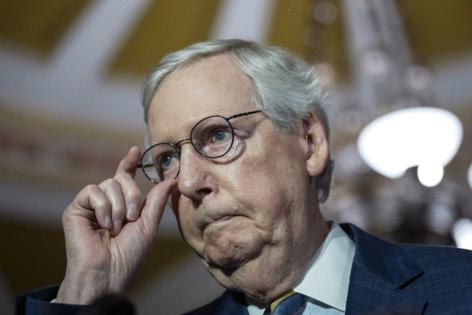
WASHINGTON — Senators filed back to town Monday with little hope of passing a war funding and border security package before they adjourn for the Christmas recess.
Expectations for a bipartisan deal sunk so low, in fact, that only 61 of 100 senators showed up for a vote Monday to confirm former Maryland Gov. Martin O’Malley as the next Social Security commissioner — a sign that sparse attendance was likely throughout the week.
While Democrats sought to keep hope alive for a border security deal this week by not ruling out some kind of framework agreement, Republicans made clear they would not be rushed into action and would not agree to a vote without time to study the actual legislative text.
“Border security policy is complex and our colleagues at the negotiating table are clear-eyed about the fact that getting this agreement right and producing legislative text is going to require some time,” said Senate Minority Leader Mitch McConnell, R-Ky. “And I’m encouraged by our colleagues’ commitment to keep making steady progress in their negotiations over the coming week and beyond.”
The chief Senate GOP negotiator, James Lankford of Oklahoma, blamed the Biden administration for waiting too long before entering talks about changes in immigration policy that would curb the flow of migrants at the southern border.
“We would have made a lot more progress and we would have had potential to be able get this done this week if they would have gotten involved earlier,” Lankford told reporters.
Majority Leader Charles E. Schumer, D-N.Y., said senators and White House staff made “significant progress” after a long weekend of negotiating. But he added: “Finding a middle ground is exceptionally hard and both sides must accept they will have to make concessions and it’s going to take some more time to get it done.”
Even the chief Democratic Senate negotiator, Christopher S. Murphy of Connecticut, began looking past this week as it became clear that a vote was unlikely until January. While he wants action as soon as possible, he said, “this set of law is so important and so complicated you gotta get it right, not get it fast.”
Republicans have insisted on measures to control the southern border to unlock an $110.5 billion aid package for Ukraine, Israel and Taiwan that they’ve already blocked once from reaching the floor.
About $65.5 billion of the supplemental would be used for military and economic aid to Ukraine. On Friday, the Pentagon told lawmakers the last $1 billion in security assistance would be delivered at the end of the year.
“I think as Ukraine’s peril becomes more serious, the urgency to get this done will rise,” Murphy said of a potential January vote.
Appropriations merger?
But January action on a war funding package would only add to an already burdensome workload in the new year. When Congress reconvenes the week of Jan. 8, lawmakers will have only 10 days to avoid a partial government shutdown, when funding for some federal agencies in a stopgap measure expires on Jan. 19.
All other government funding runs dry just two weeks later, on Feb. 2. And there’s still no bipartisan agreement on topline discretionary spending levels that would clear a path for completing the year’s final appropriations bills.
“That’s a problem,” said South Dakota Sen. John Thune, the No. 2 Senate Republican, who blamed Democrats for not passing more appropriations bills on the floor. “They have basically just wasted the last seven weeks,” he said.
The converging timelines for an emergency war package and fiscal 2024 appropriations could mean some kind of merger of the two, Thune acknowledged, while he advised against that option.
“The more moving pieces you have, the more complicated it’s going to become,” he said.
And there’s still more on the Senate’s plate that is sure to make January a tiresome month, including the need to reauthorize the Federal Aviation Administration. Senate leaders were hoping to pass a short-term extension before leaving for the Christmas recess, but even that measure appeared in jeopardy Monday.
Sen. Michael Bennet, D-Colo., said Monday he will continue to block an FAA extension into March in an effort to force action on additional Ukraine aid.
And as the workload piles up, Sen. Mike Rounds, R-S.D., said he was beginning to look at the new year with a sense of dread.
“We’ve got an FAA reauthorization, we’ve got (the farm bill), we’ve got a continuing resolution right now that cannot continue on, we gotta do an actual appropriations process, and all of this stuff comes due in January,” the South Dakota Republican said. “So we’ve got our work cut out for us and a limited amount of time to do it ... And we’re doing it with a new speaker of the House and with really, really tight numbers in the House, so this is not going to be easy.”
Before the O’Malley confirmation vote Monday, the last time more senators were absent for a vote appears to have been 15 years earlier during a debate on climate legislation.
On Monday night’s vote, most of the no-shows were Republicans, though six were Democrats including California’s Alex Padilla, who’s been openly critical of his party cutting a restrictive immigration deal with the GOP.
_____
By: David Lerman, CQ-Roll Call (Ellyn Ferguson and Peter Cohn contributed to this report.)
©2023 CQ-Roll Call, Inc., All Rights Reserved. Visit cqrollcall.com. Distributed by Tribune Content Agency, LLC.




